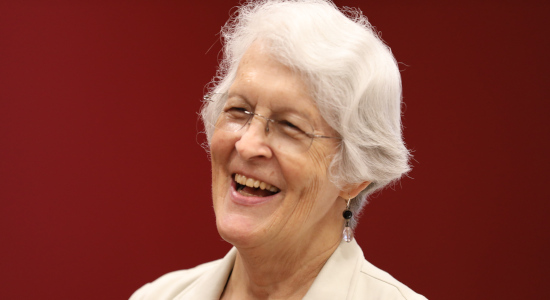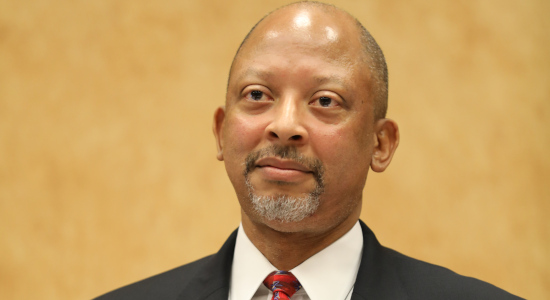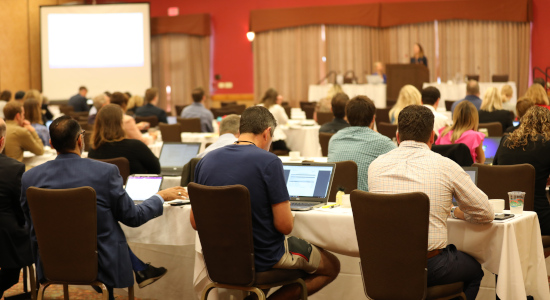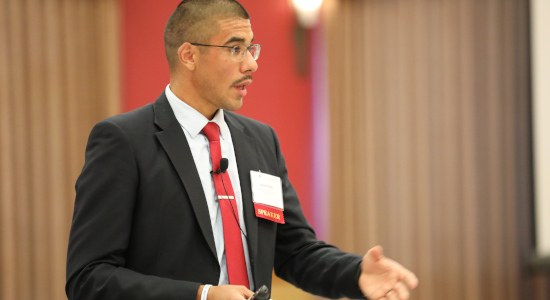
Houston attorney Phyllis Frye, the first (open) transgender judge in America, was the keynote speaker at the Health, Labor, and Employment Law Institute.
Visit the State Bar’s Facebook page for more photos of this event, or click here.
Aug. 16, 2019 – From government regulation to litigation and legislation, from social policy to cultural competency, a major theme of this year’s Health, Labor, and Employment Law (HLE) Institute was the uncertainty of change and future trends.
Approximately 200 attended this year’s two-day (Aug. 16-17) HLE Institute in Wisconsin Dells, and many health, labor, and employment law attorneys who spoke on a wide range of topics had similar advice: keep a close eye on the legal developments.
Houston attorney Phyllis Frye, the first (open) transgender judge in America, was the keynote speaker at the HLE event. Known as the “grandmother of the transgender rights movement,” Frye came out as a transgender women in the 1970s.
With a soft, Texas accent, Frye told her gender transition story and had a message to the many lawyers in attendance: speak up when you hear someone say something derogatory, even if it doesn’t apply to your religion, race, ethnicity, or gender.
Don’t let it go because “you can’t do that anymore,” Frye said. “You’ve got to say something,” even if it’s a single word or gesture to signal your disapproval.
Learn more about Frye’s transition story, and her decades-long struggle to attain equal rights for herself and the LGBTQ community, in this recent article in InsideTrack.
This remainder of this article highlights some tips and trends discussed at this year’s HLE Institute, a State Bar of Wisconsin PINNACLE® event held under the guidance of the HLE Institute Planning Committee and with the help of various co-sponsors.
Trends in Health Care Delivery
Health care is a consistent source of discussion in the legal, political, and innovation worlds. That’s why David Cade, an attorney and the CEO of the American Health Lawyers Association (AHLA), always has something new to say at the HLE Institute.

Attorney David Cade, CEO of the American Health Lawyers Association, gave an annual health law update, from a national perspective.
Visit the State Bar’s Facebook page for more photos of this event, or click here.
This year, Cade focused on data and technology in the healthcare world, and how those things will continue to impact the work of lawyers in the health care space. He also provided an update on the Affordable Care Act (ACA), still the subject of litigation.
“One of the trends I highlighted was data and data breaches,” said Cade, a former deputy general counsel at the U.S. Department of Health and Human Services.
“Data is here. We are collecting more, using it more, and there’s value in improving health care delivery through the proper use of data. Along with that benefit comes the curse of protecting it. As important it is to protect the data, we can’t lock it down.”
Cade says lawyers can assist health care clients through training and education, and implementing up-to-date systems and processes to mitigate data breaches that can cost millions of dollars to fix. Cade also discussed technology in health care today.
“It’s exploding,” he said. “We are moving farther and faster than I think anybody contemplated 10, 20, and 30 years ago in the area of technology. He said technology is allowing clinicians to reach remote areas, which provides expanded and faster care.
“Artificial intelligence is the next technology wave,” said Cade, who noted the artificial intelligence (AI) won’t replace health care providers or lawyers. It will just allow them to be more efficient in what they do, and to create more opportunities upstream.
Bullying in the Workplace
Bullying isn’t just a problem in schools. Bullying in the workplace continues to create issues for employers and the employees affected by it, and lawyers are integral in helping to identify, investigate, and prevent workplace bullying and harassment.

A Packed house for an opening plenary on bullying and harassment in the workplace, presented by attorneys Lisa Bergersen and Claire Hartley.
Visit the State Bar’s Facebook page for more photos of this event, or click here.
Lisa Bergersen, of counsel at Buelow Vetter Buikema Olson & Vliet LLC in Waukesha and a former human resources director, said “bullying is unbelievably prevalent.”
“Unlawful harassment is more measured because of administrative charges and litigation, so we have a pretty good sense of it,” Bergersen said.
“But with bullying, we don’t have those kinds of measurements. We have to rely on what’s reported anecdotally. I think it’s probably more prevalent than we actually know.”
Bergersen said there are preventative measures that lawyers can help employers implement. “But the end of the day, it’s about leaders and their commitment to the culture and the workplace, and how people treat each other,” she said.
Lawyers can help leaders understand the importance of that commitment in providing advice, Bergersen noted. But when complaints of bullying do arise, lawyers must also be prepared to investigate the circumstances and come to a conclusion.
Claire Hartley, a shareholder at Buelow Vetter and a former prosecutor, discussed techniques that lawyers can use to collect information in an investigation of bullying or harassment, including interviews with witnesses, the complainant, and the accused.
Arrest and Conviction Record Discrimination
Wisconsin’s arrest and conviction law governs what employers can and cannot do with respect to employment decisions, and define the rights of potential and current employees previously arrested or convicted of a crime.
“Very generally, Wisconsin prohibits discrimination in employment on the basis of an arrest or conviction record, unless that arrest or conviction record is substantially related to the job that they are applying for, or the job that they hold if already employed,” said Warren Buliox, an employment lawyer at MWH Law Group LLP in Milwaukee.
Buliox dove into the details of what it means for a conviction to be “substantially related” to the job, such that an employer could legally deny or terminate employment.

Attorney Jared Prado, a police officer with the City of Madison, led an interactive examination of implicit bias, cultural competency, and the role that legal professionals can play in addressing systemic bias.
Visit the State Bar’s Facebook page for more photos of this event, or click here.
Co-presenter Colin Good of Hawks Quindel S.C. in Madison, who represents employees, discussed how incarceration rates impact job prospects upon release, especially for persons of color, and how to protect rights against discrimination.
“When I’m counseling someone who is applying for a job, we want to ensure they are being truthful in their application, including any pertinent arrests or convictions, and that they are taking contemporaneous notes as to who the interviewers are,” he said.
In such cases where an applicant is qualified for a job and the arrest or conviction is not substantially related to the job, “oftentimes discrimination has occurred,” Good noted.
Independent Contractors and Joint Employment
In the growing “gig” economy, determining who is an employee or an independent contractor is no easy task. In addition, other employment arrangements, such as joint employment – one company provides staffing for another – are keeping lawyers busy.
Caitlin Madden of Hawks Quindel S.C. in Madison discussed legal developments in the area of independent contractors. She noted there are different tests, under state and federal law, to determine how a worker should be classified, and they are changing.

Attorneys Katelynn Williams (left) and Caitlin Madden discussed legal developments in the area of independent contractors and joint employment in the gig economy.
Visit the State Bar’s Facebook page for more photos of this event, or click here.
“The gig economy and the types of employment that people are seeking out today is leading to a lot of questions,” Madden said.
“For example, whether someone driving for a ride-sharing service is controlled sufficiently by that company to be considered an employee of the company.”
Madden also noted the influx of job-sharing applications, such as TaskRabbit, which connects people with work in their own communities. “There’s a lot of questions as to who employs that person, which has implications … under a litany of laws,” she said.
Katelynn Williams of Foley & Lardner in Madison joined Madden to speak on joint employment issues. These arrangements generally arise with a staffing agency that pays employees, but the employee is working offsite, say, for a manufacturing plant.
“Both the staffing agency and the manufacturing plant could be considered to jointly employ that single individual,” Williams said. She said government agencies and courts use numerous different tests under different circumstances, but the common theme is the employer’s level of control over the daily activities of an individual worker.
“Attorneys should be on the lookout for a lot of changes in this area,” Williams said. “Both the Department of Labor and the National Labor Relations Board currently have proposed rules out there. That will have a big ripple effect when those come out.”
Look for Webcast Replays of the 2019 HLE Institute
The above tips and trends only scratch the surface of the information that attendees learned at this year’s HLE Institute. But don’t worry. Selected sessions were recorded and will be replayed as webcasts Sept. 19-20 and October 15-16.
Did you attend the event but miss a recorded session at the HLE Institute? Registered attendees have free access to the webcasts in September and October.
Register for the HLE webcasts at the WisBar Marketplace.
HLE Institute Planning Committee
Doris E. Brosnan
von Briesen & Roper, S.C.
Milwaukee
Carmen N. Decot
Foley & Lardner LLP
Milwaukee
Daniel J. Finerty
Lindner & Marsack, S.C.
Milwaukee
Sara J. Geenen
The Previant Law Firm, S.C.
Milwaukee
Colin B. Good
Hawks Quindel, S.C.
Madison
Marybeth Herbst-Flagstad
Associated Benefits and Health Risk Consulting
Brookfield
Larry Johnson
Hawks Quindel, S.C.
Milwaukee
Julie A. Lewis
Lewis Law Office LLC
Madison |
|
Sarah J. Murphy
Ascension Health
Milwaukee
Tom G. O'Day
Godfrey & Kahn, S.C.
Madison
Erica N. Reib
O'Neil, Cannon, Hollman, DeJong & Laing, S.C.
Milwaukee
Leah J. Ruedinger
Janesville
Thomas N. Shorter
Godfrey & Kahn, S.C.
Madison
Jill Hamill Sopha
Sopha Mediation LLC
Madison
State Bar Staff:
Erin V. Everett
PINNACLE© Seminars Division
Madison |
HLE Sponsors and Exhibitors
Godfrey & Kahn, S.C. (sponsor)
Hall, Render, Killian, Health & Lyman (sponsor)
Hawks Quindel S.C. (sponsor)
Lindner & Marsack (sponsor) |
|
Professional Insurance Programs (exhibitor)
Von Briesen & Roper S.C. (sponsor)
Wipfli LLP (exhibitor) |
